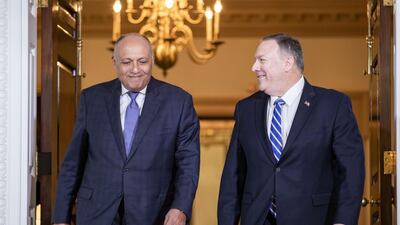Officials from Egypt, Ethiopia and Sudan agreed to hold two technical meetings in the coming weeks to try to resolve their dispute over the construction of a $4.8 billion (Dh17.62bn) project on the Nile.
The foreign ministers of the three countries met in Washington on Monday with US Treasury Secretary Steven Mnuchin and World Bank President David Malpass.
Ethiopia's Grand Renaissance Dam is being built on the Blue Nile tributary, which accounts for about 85 per cent of the Nile's water.
Construction of the dam is about 70 per cent complete.
Cairo says the project, near Ethiopia's border with Sudan, is an “existential threat” that could worsen its water crisis.
Egypt wants Ethiopia to agree to release a minimum of 40 billion cubic metres of water from the dam annually.
It has also demanded that the dam's reservoir be filled over a longer period than the four years planned by Ethiopia, to keep water available during droughts.
Egyptian President Abdel Fattah El Sisi invited the United States to mediate two months ago after Cairo and Addis Ababa threatened to resort to military action to defend their interests.
This was the second time in a month in Washington that the foreign ministers of Egypt, Sudan and Ethiopia – Sameh Shoukry, Asma Abdallah and Gedu Andargachew – met Mr Mnuchin and Mr Malpass.
The water resources ministers of the three countries also held a meeting.
On Monday, the ministers expressed appreciation for the observer roles played by the US and World Bank, and "noted the progress achieved in the technical meetings among the ministers of water resources in Addis Ababa and in Cairo".
They also said that "the strategic direction of the next two technical meetings should be the development of technical rules and guidelines for the filling and operation of [the dam], the definition of drought conditions, and drought-mitigation measures to be taken".
The African nations also stressed the benefit of reaching an agreement by mid-January.
The US hosted the first meeting on November 7, with the three countries reaffirming their commitment "to reach a comprehensive, co-operative, adaptive, sustainable and mutually beneficial agreement on the filling and operation" of the dam by January 15.
If no such agreement is reached, the foreign ministers agreed that Article 10 of the 2015 Declaration of Principles, which would bring in outside mediation, would be invoked.
Monday's meetings are due to be followed by another round of talks on January 13, but there has been no statement by the US on any progress.
A Treasury Department official contacted by The National was not immediately available for comment.
"Egypt and Ethiopia have been pursuing negotiations for nearly a decade while failing to reach any substantive agreement," Timothy Kaldas of the Tahrir Institute told The National.
But Mr Kaldas said that bringing the US into the negotiations was “potentially promising”.
Egypt has little influence over Ethiopia and that has been a challenge for Cairo, he said.
Mr Kaldas said one way to a breakthrough would be if the US and the World Bank offered Ethiopia incentives to compromise on how quickly it filled the dam's reservoir.
“[The dam] will be completed. The debate is over the conditions surrounding the dam's reservoir and how to minimise the impact on Egypt's water supply,” he said.
Meanwhile, US Secretary of State Mike Pompeo on Monday met Mr Shoukry, Egypt's foreign minister.
They discussed Libya, US-Egyptian ties, concerns over press freedom, human rights and Americans detained in Egypt, the State Department said.


